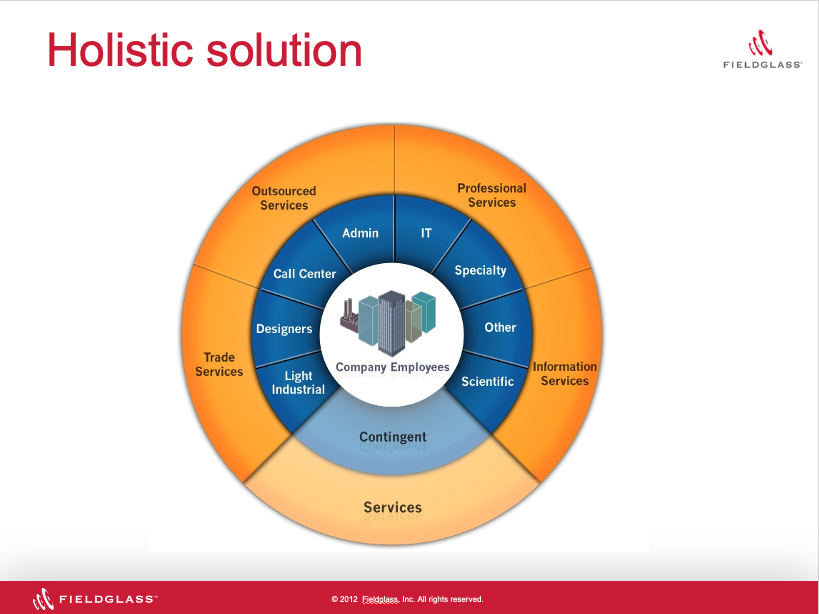Why Vendor Management Systems are Essential for Business Success


Discover the key reasons why incorporating a vendor management system is crucial for achieving business success.
Streamlining Vendor Selection Process
A vendor management system like SAP Fieldglass can greatly streamline the vendor selection process for businesses. It provides a centralized platform where businesses can manage their vendor relationships, track vendor performance, and evaluate vendors based on predefined criteria.
At the core of this is shining a spotlight into a process that was previously "dark and largely unmanaged". This is a slide from the early days of Fieldglass that was used to illustrate:

A VMS eliminates the need for manual processes and spreadsheets, saving time and effort for the procurement team. With a vendor management system, businesses can easily compare vendor proposals, negotiate contracts, and make informed decisions about which vendors to work with.
By automating the vendor selection process, businesses can ensure that they are engaging with the most qualified vendors who meet their specific requirements. This leads to better vendor partnerships and ultimately improves the quality of products or services delivered by vendors.
Enhancing Vendor Performance and Accountability
One of the key benefits of a vendor management system is the ability to enhance vendor performance and accountability. With a vendor management system, businesses can set performance metrics and track vendor performance against these metrics. This allows businesses to identify underperforming vendors and take necessary actions to improve their performance. For the first time procurement or finance can have data driven conversation with a business stakeholder about which suppliers are performing and which are not
Additionally, a vendor management system enables businesses to hold vendors accountable for meeting contractual obligations. It provides visibility into vendor activities, such as delivery timelines, quality of work, and adherence to compliance standards. This promotes transparency and ensures that vendors are delivering as per the agreed-upon terms, leading to improved overall vendor performance.
Improving visibility and therefore achieving Cost Management and Efficiency
Another significant advantage of implementing a vendor management system is improved visibility into vendor activities and expenses. With a vendor management system, businesses can track vendor invoices, payments, and expenses in a centralized platform. This provides real-time insights into vendor costs, and more-so commercial margins, allowing businesses to identify cost-saving opportunities and optimise their vendor spend.
Furthermore, improved visibility enables businesses to identify areas of inefficiency and implement process improvements. By analyzing vendor performance data and operational metrics, businesses can identify bottlenecks, streamline processes, and achieve cost management and efficiency.
In the early days of Fieldglass we also talked about the lack of visibility across the different worker types - FTE - Contractors - Consultants. The illustration below was one of the first Fieldglass slides:

I remember conversation with senior HR leaders not recognising how much work had migrated away from their FTE and into the contingent workforce. In 2018/19 SAP Fieldglass commissioned a study from Oxford Economics that showed over 40% of work was now done by non employees. I would be very curious to see what the numbers look like for midmarket companies.
Mitigating Risks and Ensuring Compliance
A vendor management system plays a crucial role in mitigating risks and ensuring compliance for businesses. It allows businesses to assess vendor risk profiles, conduct due diligence, and monitor vendor compliance with industry regulations and internal policies.
By implementing a vendor management system, businesses can establish a standardized process for vendor risk assessment and compliance monitoring. This helps in identifying and addressing potential risks before they escalate, reducing the chances of disruption to business operations. Additionally, the system can generate compliance reports, providing evidence of adherence to regulatory requirements.
What became critical over time was the classification risk - Microsoft's worker co-employment court case in the US was the initial driver but more and more we saw local issues in the UK with the Dragonfly case in 2008 and many subsequent cases including the much published cases evolving with Uber and other firms using large volumes of Gig-workers
Driving Long-Term Vendor Relationships
Vendor management systems like SAP Fieldglass enable businesses to build and nurture long-term vendor relationships. By maintaining a centralized repository of vendor information, businesses can easily track vendor performance, history, and relationship details. This allows businesses to make informed decisions when renewing contracts or engaging in new projects with existing vendors. Many times a vendor will also get access to more of the buyers roles. Perhaps they initially served the client in one location or only one of the clients business unit, but can now have a chance of bidding on more of the clients spend
Furthermore, a vendor management system facilitates effective communication and collaboration between businesses and vendors. It provides a platform for sharing feedback, addressing issues, and fostering a mutually beneficial partnership. Building long-term vendor relationships not only improves the quality and reliability of vendor deliverables but also opens doors for potential cost savings and innovation.



Blog comments